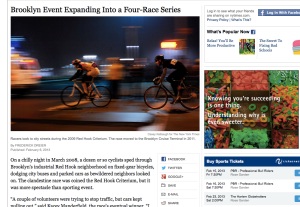
(Image via NY Times)
We start off our best-of-the-web recap today with several stories about car ownership and car culture…
— It seems to be getting more and more expensive to own a car. A few weeks back we shared that the annual cost of ownership had passed $10,000 (in Canada), now this week comes news that the price of gas accounts for the largest shared of household income in 30 years.
— And if that’s not enough, a study from the Texas A&M Transportation Institute found that America loses $121 billion in wasted time and fuel from sitting in traffic: That’s an average of $848 per capita (not to mention the dire environmental impacts).
— And to make matters worse, another new study has found that when you fill up at a local gas station, a whopping 66% of your cash goes to oil company coffers, “while very little of the remaining cash goes into the local economy.”
— A reporter for the Chicago Tribune outlines six reasons he foresees the end of America’s love affair with automobiles.
— Yet despite considerable (and negative) social, economic, and environmental impacts of our auto-centric society, the auto industry is hoping we buy even more cars. A global auto industry trade publication says that a full recovery from the automotive sector relies on, “consumers making multiple purchases.
— But it might be harder for Chicago Mayor Rahm Emanuel to retrofit his city with better bike access. Streetsblog Chicago broke the news that the State is putting up bureaucratic road blocks to his plan to build 100 miles of protected bike lanes.
“Is urbanism the new trickle-down economics?”
— Via Atlantic Cities, a Danish study shows kids who walk and bike to school “performed measurably better on tasks demanding concentration.”
— That study, and other stories about the connection between brain function and bicycling, have led Atlantic Cities reporter Sarah Goodyear to call for more research into the topic.
— The talk of how to pay for our roads continues to heat up. Here’s the latest from Politico on the potential of a vehicle-miles traveled tax.
— The relationship between police and people on bicycles continues to be one we, as a country, are still struggling to figure out. Here’s an interesting look at how bike advocates in California’s East Bay area are moving forward.
— As urban bicycling continues to take off, folks are finding that front racks/baskets are quite useful. Here’s an interesting “bent basket” design on Kickstarter.
— Gun buy-backs are in the news a lot these days. I’ve heard of authorities giving grocery store gift cards in exchange for guns; but in Uruguay, Treehugger reports that guns are being exchanged for bikes.
— Here’s some great news from the bike racing front: A fixed-gear race in New York City has picked up a major sponsor (Rockstar video games) and will expand into a four-race series.
— Aaron Renn of the Urbanophile blog made us put on our thinking caps with his latest piece: Is Urbanism the New Trickle-Down Economics?. Renn argues that progressives (the left) are the ones primarily pushing the bike, walk, and transit-friendly cities with dense housing and commercial zones; and that they are also pushing out those who can’t afford to live in such places.
— Another side of that argument might be Portland’s “Cartlandia” food pod. Situated just a few steps from the popular Springwater Corridor bike path, the development has proven successful in creating community in southeast Portland.
— We are all aware of the friendly competition between Portland and Minneapolis when it comes to biking; but how do the two cities’ transit networks compare?
— The can-bike-share-work-with-helmets debate has a new front: Seattle.
— Need advice on how to keep warm while biking in winter? This page is full of good tips.
— The latest from Bogota, Colombia — the city that inspired the open streets movement in America (including Portland’s Sunday Parkways) — is that their ciclovias have been institutionalized via a public referendum.
We recap the web’s best bike and transportation stories each Monday. Get in touch if you come across a link we should know about. To keep up with more great bike stories throughout the week, follow @bikeportland on Twitter.

